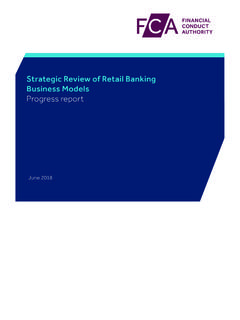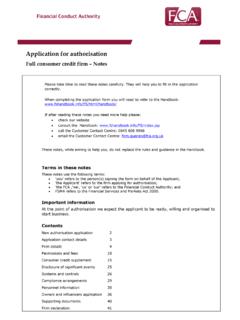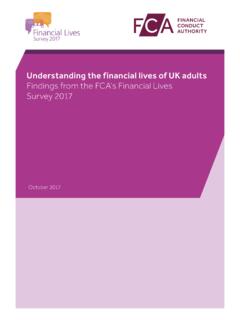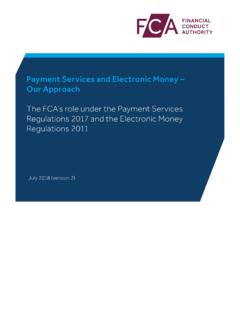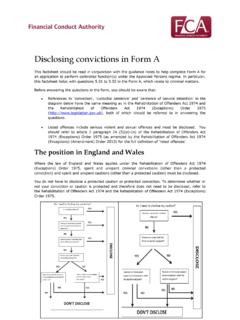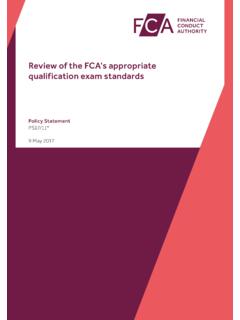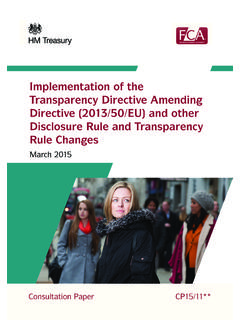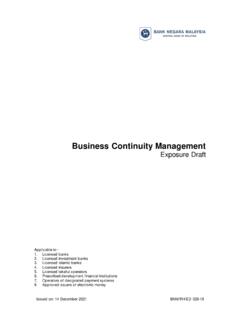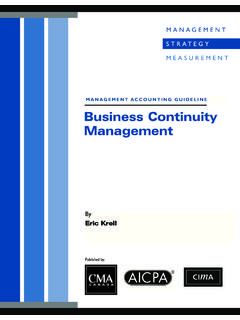Transcription of CP19/32: Building operational resilience: impact ...
1 Consultation PaperCP19/32**December 2019 Building operational resilience : impact tolerances for important business services and feedback to DP18/042CP19/32 Financial Conduct AuthorityBuilding operational resilience : impact tolerances for important business services and feedback to DP18/04 How to respondSign up for our weekly news and publications alertsSee all our latest press releases, consultations and speeches. We are asking for comments on this Consultation Paper (CP) by 3 April can send them to us using the form on our website at: in writing to:Governance & Professionalism Policy Strategy & Competit ionFinancial Conduct Authority12 Endeavour SquareLondon E20 1 JNEmail.
2 Summary32 The wider context 63 Example firms 94 Important business services 105 impact tolerances 156 Mapping and scenario testing 207 Communications, governance and self-assessment 268 Outsourcing and third-party service provision 30 Annex 1 Questions in this paper 36 Annex 2 Cost benefit analysis 37 Annex 3 Compatibility statement 52 Annex 4 Examples of relevant existing FCA requirements 56 Annex 5 Abbreviations in this paper 60 Appendix 1 Draft Handbook textAppendix 2 Draft Handbook text (Exiting the European Union)3 CP19/32 Chapter 1 Financial Conduct AuthorityBuilding operational resilience : impact tolerances for important business services and feedback to DP18/041 SummaryWhy we are We are proposing changes to how firms approach their operational Our proposals build on the approach first outlined in the Discussion Paper (DP) Building the UK Financial Sector s operational resilience published in July 2018.
3 Respondents were supportive of the ideas in the DP, and sought further information about how the ideas would work in This Consultation Paper (CP) aims to expand on and develop the ideas discussed in the DP based on the responses received and asks for your feedback on our this applies This consultation affects banks, Building societies, Prudential Regulation Authority (PRA) designated investment firms, Solvency II firms, Recognised Investment Exchanges (RIEs), Enhanced scope Senior Managers & Certification Regime (SM&CR) firms and entities authorised or registered under the Payment Services Regulations 2017 (PSRs 2017) and/or the Electronic Money Regulations 2011 (EMRs 2011).
4 This CP does not apply to European Economic Area (EEA) firms. Please see Appendix 1 (Draft Handbook text) for further details on our proposed application of the proposals in this consultation. Appendix 2 contains the version of the instrument that would be made if the UK exits the European Union prior to the rules being Consumers may be interested in how operational resilience is being improved within of our We propose firms: identify their important business services that if disrupted could cause harm toconsumers or market integrity identify and document the people, processes, technology, facilities and informationthat support a firm s important business services (mapping) set impact tolerances for each important business service (ie thresholds formaximum tolerable disruption)
5 Test their ability to remain within their impact tolerances through a range of severebut plausible disruption scenarios conduct lessons learned exercises to identify, prioritise and invest in their ability torespond and recover from disruptions as effectively as possible4CP19/32 Chapter 1 Financial Conduct AuthorityBuilding operational resilience : impact tolerances for important business services and feedback to DP18/04 develop internal and external communications plans for when important businessservices are disrupted create a self-assessment Our proposals are not intended to conflict with or supersede existing requirements to manage operational risk or business continuity planning, but rather aim to set new requirements that enhance operational The Payment Services Regulations (PSRs 2017) require Payment Service Providers (PSPs)
6 Including credit institutions to establish a framework with appropriate mitigation measures and control mechanisms to manage their operational and security risks. As part of that framework they are required to establish and maintain effective incident management procedures, including for the detection and classification of major operational and security incidents. On 12 December 2017, the European Banking Authority (EBA) issued detailed guidelines on the security measures for operational and security risk of payment services under the Payment Services Directive 2 (PSD2). The EBA Guidelines include steps to be undertaken by firms on a regular and ongoing basis to identify their supporting processes and assets, to establish and implement preventive security measures, to test and assess their resilience plans against a range of scenarios, and to prioritise business continuity actions using a risk-based approach.
7 As the national competent authority, we announced that we would comply with these Guidelines. 1 .11 Our analysis of the payments sector has concluded that even small payments firms can be highly impactful in terms of harm arising from operational disruptions as disruptions can quickly lead to consumers not having access to their money. Smaller payments firms are also more likely to be technology dependent in comparison to smaller FSMA-authorised firms. For example, Registered Account Information Service Providers (RAISPs), although small in size compared to other payments firms, are key repositories of consumer information and could cause significant harm should they suffer from a data On 28 November 2019, the EBA published its final guidelines on information and communications technology (ICT) and security risk management.
8 These guidelines will replace the PSD2 guidelines and set out requirements for credit institutions, other payment service providers and Capital Requirements Regulation (CRR) investment firms. We will confirm during 2020 our approach to these guidelines. We will also provide further clarification on the links between our operational resilience policy and the EBA guidelines. While our proposals aim to set specific new requirements, Annex 4 highlights examples of existing Handbook provisions and other legislative provisions which could be interpreted as covering similar areas. We recognise that as a result of existing legislation some firms are already undertaking some of the practices recommended in this CP.
9 We welcome feedback from firms on how they are doing so and any potential areas of CP19/32 Chapter 1 Financial Conduct AuthorityBuilding operational resilience : impact tolerances for important business services and feedback to DP18/04 Next We have developed the policy proposals and the underlying draft rules in the context of the existing UK and European Union (EU) regulatory framework. We will keep the policy proposals under review to assess whether any amendments will be required due to changes in the UK regulatory We want to know what you think of our proposals. Please send us your comments by 3 April Use the response form on our website, email us at or write to us at the address on page We will consider all feedback and publish our finalised rules in a Policy Statement (PS) n e x t ye a 2 Financial Conduct AuthorityBuilding operational resilience .
10 impact tolerances for important business services and feedback to DP18/042 The wider The FCA, Bank of England in its capacity of supervising financial market infrastructures (FMIs) and PRA ( the supervisory authorities ) continue to develop a policy framework for operational resilience based on the concepts in the DP. Our aim is to improve the resilience of the UK financial sector. The supervisory authorities have jointly published a policy summary of the key concepts outlined in our consultation papers. Dual-regulated firms should also consult the PRA s CP in addition to this This work has been undertaken as part of our long-term priority in relation to the resilience of firms and the wider FCA prioritisation of operational resilience for 2019 operational resilience is the ability of firms and the financial sector as a whole to prevent, adapt, respond to, recover and learn from operational disruptions.
